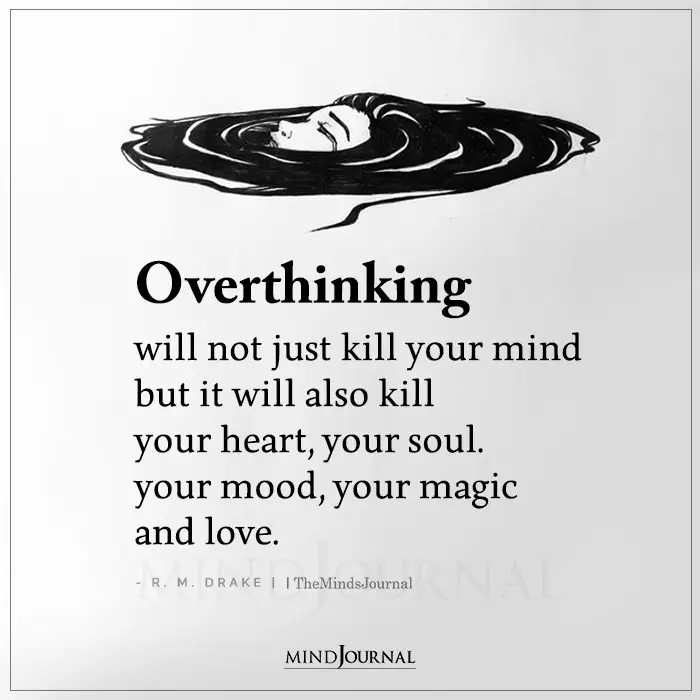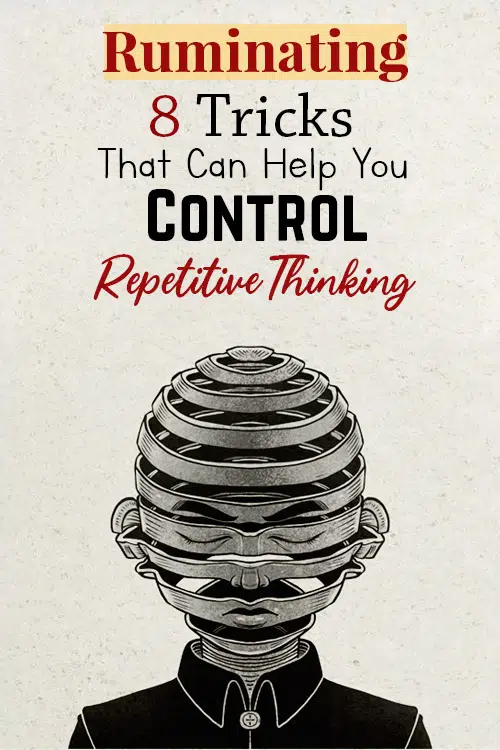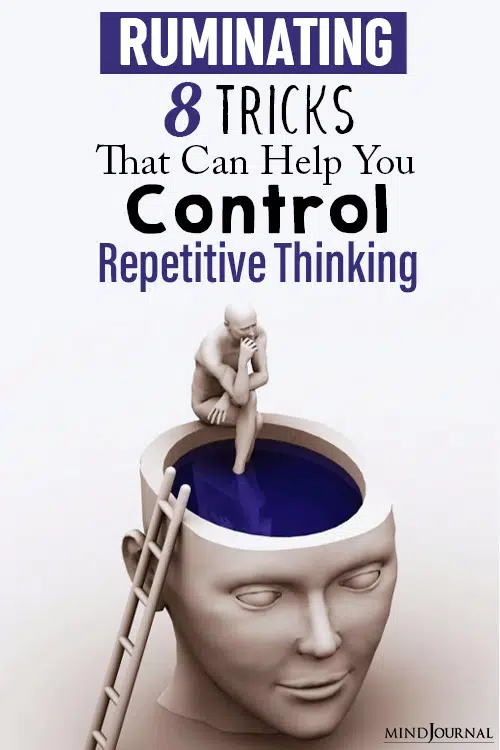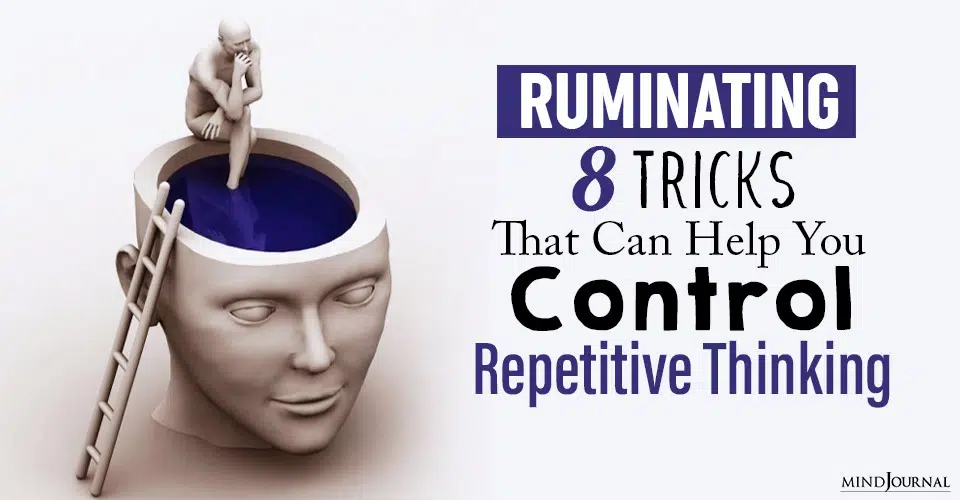Deep thinking is an admirable and beautiful trait to have. To have the ability to go deep inside, and think in ways that rarely anybody else thinks, is something you should always be proud of. However, there is a thin line between deep thinking and repetitive, obsessive thinking, and the second one does not sound that good, does it? Sounds exhausting and annoying, right?
Ruminating does not always have to be a bad thing, but too much of it can be. Breaking the habit of rumination is hard, especially when you keep on giving in to it, everything something goes wrong, or you face some trouble and inconvenience. Ruminating transforms into a bad habit, the moment you let your emotions control you, instead of using them to solve your difficulties and problems.
Obsessive, repetitive thinking will never do you any good, but if you have the ability to understand your emotions and with the help of it, deal with what you are facing in life, that’s when ruminating is a good thing. Otherwise, it’s really not. However, the good news is, there are a few techniques you can practice, and with the help of which, will be able to control this.
What Are The Causes Of Ruminating, Or Repetitive Thinking?
Everybody ruminates at some point or the other, for various reasons. Maybe you have an important job interview coming, or your father is going to undergo major surgery. There can be many reasons behind repetitive thinking and the more you know the causes, the better you might be able to handle it.
Here are a few causes that might contribute to your ruminating:
- Emotional and psychological stressors, such as a breakup, or losing your job.
- The inherent need to be perfect all the time.
- Past or recent trauma.
- Phobia, especially if you have to face your fears in the coming days. For example, feeling apprehensive about a major interview, because you suffer from social anxiety.
- Having feelings of low self-worth and low self-esteem.
- Impending events that are a source of stress, such as exams.
- Waiting for the results of something extremely important, that can have a direct impact on your life, like waiting for your medical test results.
8 Tricks That Can Help You Control Your Ruminating
1. Focus on accepting what is.
Sometimes you need to accept certain things and stop fighting to change them, no matter how painful they might be; acceptance can give you the peace of mind that resisting can never. However, accepting painful things does not mean accepting abuse, insults, and anything morally wrong, it’s more about accepting things like death. Losing a loved one is always tough, but stopping yourself from feeling that grief will hurt you more.
Ruminating about this over and over again will break your heart, over and over again. It’s hard accepting that someone you love is not there anymore, but trying to make your peace with it, and accepting it will not only make you stronger, but it will also make you happier and more peaceful with time. With the help of acceptance, you can control your rumination to a large extent, and work towards achieving mental peace.
Related: The Ruminating Mind: 4 Steps To Help Deal With Negative Thoughts
2. Realize the kind of thoughts running through your mind.
Sometimes ruminating happens, and you don’t even realize it. This might sound absurd, but it’s true, rumination can happen without you even knowing about it. Normally you might find yourself ruminating when you are alone, especially when you don’t have anything to do. When you are driving or cooking, you might find yourself constantly thinking about all the things you need to do. Going over this mental to-do list again and again, just makes your ruminating worse.
One of the best ways to control something is by trying to understand what is happening. The moment you notice that you are ruminating, and it’s making you feel more stressed out, you can pause it or put a stop to it. Acknowledge what is going on, what you are thinking, and consciously make a decision of pausing it, and give yourself some breathing space. Consistently practicing this can help you kick this habit.
3. Distract yourself whenever things get too overwhelming.
When it comes to ruminating, distractions can be a blessing sometimes, you know? When you find yourself repetitively thinking about something, maybe it’s a good idea to involve yourself in something else and distract yourself for a few hours. Ruminating can emotionally and mentally exhaust you, and can even take a toll on your mental health. If you feel that something is overwhelming you, try to busy yourself doing something else.
Do something that gives you joy and happiness and most importantly, calms you down. This will prevent your mind from being all over the place, and instead of feeling tensed and anxious, you will feel peaceful. Distractions have always got a bad rap, but sometimes they can indeed help you deal with the difficult and scary thoughts that keep on racing through your mind.
So, the next time you find yourself ruminating about the same thing constantly, distract yourself with something that makes you feel better.

4. Fall back on your close ones for emotional support.
If you have a strong support system in your life, then you are one of the lucky ones; your family and friends can ensure that you don’t have to work on this all alone. Lean on your close ones if you find yourself drowning in a pool of negative thoughts that keep on swirling around in your mind. You don’t have to deal with this alone, and you don’t have to sit around and try to come up with solutions alone when you have supportive people in your life.
Even though they might not be able to always solve your problems, but they can provide you with different perspectives, which can make the load a bit lighter. They can be good listeners, with whom you can share what’s bothering you, or they can simply be there with you, as a strong pillar for you to lean on. Always remember that it’s okay to ask for help.
Related: When You Start Healing Yourself, The Rest Will Fall Into Place
5. Know your triggers.
What are triggers really? Triggers are something that touches upon a negative emotion in you and pushes you to react in a negative way. Triggers can be associated with memories, smells, objects, expressions, words, or literally anything else. While traveling for work, you might see something on the road, and that might trigger you to react in a certain way because you associate something personal with that thing.
Triggers are not just hard to deal with, if not checked at the right time, it can just make your ruminating worse. You will be stuck in a loop of vicious, negative thoughts, getting out of which can prove to be next to impossible. So, the best thing to do in such situations is to identify what is triggering you and try to stay away from them.
Negative emotional triggers can be a hard thing to deal with, but understanding what they are, and making the effort of controlling their impact on you is one of the best things you can do for yourself.

6. Do what you think is best.
There might be times when you think you have got the perfect solution to control your ruminating, and you know what you should do? Try it out! If you think you have a plan for making this better, then try out your solutions and see what happens. You might feel pessimistic, but you won’t know what works and what doesn’t if you don’t give it a try, right? Yes, there is a chance that it might not work, but there is also a strong chance that this was the solution you were always looking for.
However, before doing anything, make sure you understand the difference between an intelligent, effective solution and a random one. Try to understand what it is you should do and if it makes sense or not. If it does, then go for it, and see what happens.
7. Practice the art of letting go.
Sometimes when things seem too overwhelming and it feels like you are drowning in a sea of thoughts, the best way to make yourself feel better is by letting certain things go. Not every situation warrants a reaction, least of all rumination. Holding on to all the little things that make you mad is only going to make you madder. So sometimes, it’s better to let certain things go and try to preserve your peace of mind.
Having an emotional reaction to everything, and ruminating for days on end will only make things harder for you, and it’s never a pleasant experience, is it? You will see with time, that certain problems take care of themselves on their own, and never needed your rumination after all.
Related: 13 Signs You Have Negative Energy and How To Get Rid Of It
8. Practice meditation.
Meditation is not just relaxing, it’s a powerful weapon against ruminating and can help you tremendously if you are having a hard time dealing with it. It can mentally and emotionally refresh you, and calm down your difficult and scary thoughts. With every deep breath you take, you are telling your mind that everything is going to be fine, and no matter what happens, you will be able to overcome it.
Focusing on your breath while meditating is therapeutic and can really help you deal with everything that is going on in your mind. With time and practice, you will see the knots in your mind and soul untangle and give way to clarity, calmness, patience, and understanding.
If you are serious about putting a stop to ruminating, then it’s a good idea to practice all of the tips mentioned above, because these can be really effective, in the short-term as well as in the long-term. After trying all of these out, if you still feel that you need more help then seeking out professional help is your best bet. Whichever path you choose, remember not to be too hard on yourself about this; be kind to yourself and give yourself some time and patience to deal with this. You got this!










Leave a Reply
You must be logged in to post a comment.